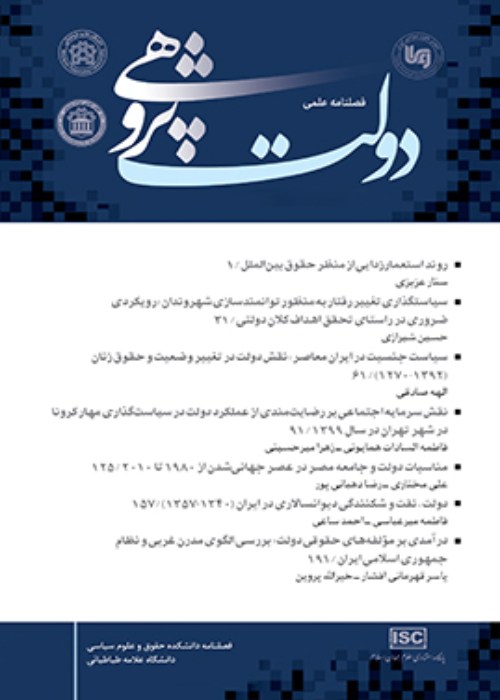The Oriented-Development's Policy in Sazandegi Government and its Requirements for Iran's Foreign Policy
Author(s):
Abstract:
Purpose
Seeking development has always been one of the top priorities of developing countries. For this reason, various governments have tried to follow relevant policies as one of the politico- economic priorities. In Iran, given that after eight years of Holy Defense, many industrial, economic and agricultural infrastructure were destroyed, the pursuit of development-oriented policy became one of the main slogans of the government of the time to an extent that the government of Hashemi Rafsanjani called itself the Sazandegi (constructive) Government. Considering that achieving development requires cooperation in both domestic and foreign policies, the aim of the present paper is to show the requirements of foreign policy in order to realize the development-oriented policy in Sazandegi Government. In particular, the paper seeks to answer this question: What changes took place in Irans foreign policy for adapting itself based on the development-oriented policy? The main hypothesis refers to a changing of foreign policy priorities of Iran and its compliance with internal and international contexts. Thus, Iran, in addition to changing the tone of its speech in the region, attempted to demonstrate new figures to attract foreign investors.Design/Methodology/Approach: This paper is formed and based on the theory of economic liberalism with the descriptive-analytic method. The research data is collected from hard and electronic sources such as papers, books, journals etc.
Findings: The research findings show that in the state level, Iran, for détente in its foreign relations, improved its relations with the EU, China, Russia and neighboring Arab countries. In regional and international levels, Iran followed the policy of strengthening and revitalization of eco-organization, de-politicization of OPEC, use of the capacity of the Organization of Islamic Conference, and more interaction with the United Nations, the World Bank, and the International Monetary Fund. To achieve this purpose, Iran reduced its ideological propaganda and changed its tones on export of revolutionary ideals in Middle East. At this time, creating an Islamic Japan was considered the gateway of exporting of the Islamic revolution and the government attempted spend all its energy to improve the economy. On this path, the government even embarked upon reforms in the foreign ministry. Although adjustment instances of Iransgovernment in some areas of foreign policy could help to achieve a development-oriented policy, such changes were insufficient and the enforcement of new sanctions against Iran challenged its policy of détente and attraction of foreign investment. In the economic aspect, Iran merged adopted global economy and moved away from the Islamic economic model. The implication of this policy was the growth of liquidity level and the spread of poverty and injustice in the society.
Originality/Value: Trying to introduce the measures of Irans government in foreign policy for adapting itself with the development-oriented policy is the first criterion that distinguishes the present paper from other research. Also, the article has concentrated on economic indexes of development-oriented policy, and, in this way, distinguishes itself from other research efforts. Besides these two issues, the paper does not have a black and white viewpoint to successes and failures of the government of Hashemi Rafsanjani and tries to explain the effect of world economy on some politico-economic decisions of the government.
Keywords:
Language:
Persian
Published:
Studies the State, Volume:2 Issue: 6, 2016
Pages:
133 to 173
magiran.com/p1591112
دانلود و مطالعه متن این مقاله با یکی از روشهای زیر امکان پذیر است:
اشتراک شخصی
با عضویت و پرداخت آنلاین حق اشتراک یکساله به مبلغ 1,390,000ريال میتوانید 70 عنوان مطلب دانلود کنید!
اشتراک سازمانی
به کتابخانه دانشگاه یا محل کار خود پیشنهاد کنید تا اشتراک سازمانی این پایگاه را برای دسترسی نامحدود همه کاربران به متن مطالب تهیه نمایند!
توجه!
- حق عضویت دریافتی صرف حمایت از نشریات عضو و نگهداری، تکمیل و توسعه مگیران میشود.
- پرداخت حق اشتراک و دانلود مقالات اجازه بازنشر آن در سایر رسانههای چاپی و دیجیتال را به کاربر نمیدهد.
In order to view content subscription is required
Personal subscription
Subscribe magiran.com for 70 € euros via PayPal and download 70 articles during a year.
Organization subscription
Please contact us to subscribe your university or library for unlimited access!



